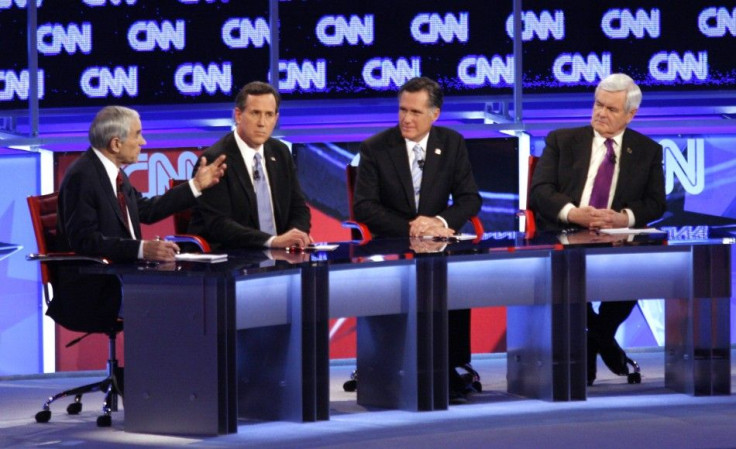Election 2016: Conservatives Make It Hard For GOP To Control Number Of Debaters; The 'Clown Car' Problem

WASHINGTON — Republicans were hoping they'd heard the last of the clown car jokes. At the peak of the 2012 primary cycle, with about 10 candidates in the race, the debates crowded with no-names and no-hopers made the GOP look weak. Determined to avoid that fate in 2016, the Republican National Committee (RNC) announced it would take charge of the debate process.
That sounded like a wise move: There are likely to be even more GOP candidates this time, and nobody wants the party to be a punch line again. But which candidates will be pushed offstage?
So far, six Republicans are officially running: former Arkansas Gov. Mike Huckabee; Carly Fiorina; Dr. Ben Carson; and Sens. Ted Cruz, R-Texas, Marco Rubio, R-Fla., and Rand Paul, R-Ky. Four more have already signaled times for likely announcements: Sen. Lindsey Graham, R-S.C., former New York Gov. George Pataki, former Texas Gov. Rick Perry, former Sen. Rick Santorum, R-Pa. Louisiana Gov. Bobby Jindal, former Maryland Gov. Bob Ehrlich, Ohio Gov. John Kasich and former Virginia Gov. Jim Gilmore are exploring potential runs. And then there are the almost-certain candidates: Jeb Bush, Scott Walker and Chris Christie. That's 17 names.
Toss in some more long shots – like Sarah Palin and Donald Trump – and there could be as many as 20 Republican hopefuls by the time the Iowa caucuses start counting votes.
The RNC has set the first debate for Aug. 6. It's not clear how many candidates will be allowed to take part (Politico reported a growing desire to limit the field to 12), who will ultimately make the choice or what the criteria will be. The total amount of money raised? Number of individual donors? Performance in polls? Pushing out Fiorina or Carson would be a PR disaster, hurting the party's attempt to portray itself as demographically inclusive. But excluding any candidate is sure to annoy and alienate some constituency or voters.
Candidates with low name recognition or little funding can benefit enormously from a good debate performance. Prohibiting them from having that chance would add to the deep distrust between the party's establishment and conservative wings. The GOP owes many of its political gains in Washington to the tea party movement, so if right-wing candidates are left out, conservatives are unlikely to take it quietly. The RNC would avoid a clown car only to create another kind of circus.
“There would be so much outrage if they didn’t start inclusively,” John Brabender, a former Santorum strategist, told the New York Times. “It would look like the party was once again playing arbiter of who they want to be a nominee.”
To avoid the damaging right-wing battles that helped lead to the nomination of a moderate in the past two cycles, GOP conservatives were hoping to coalesce early around one like-minded candidate. That hasn't happened. Establishment Republicans would also like to avoid a drawn-out fight. With Romney sitting out and N.J. Gov. Chris Christie weakened, it briefly looked as though Jeb Bush might quickly become the consensus candidate. But his public performance (unlike his fundraising) has been underwhelming.
While the RNC figures out how to handle the debate issue, Republicans are working to portray their mile-wide field in positive terms.
“You have an incredibly deep bench on the Republican side,” said Mark Meckler, who co-founded the Tea Party Patriots and is now president of Citizens for Self Governance. “You have so many rising stars, it’s hard to know where to look. You have rising stars, males and females, and gender diversity and color diversity and religious diversity.”
They cite the minuscule Democratic field as evidence that the party is shrinking, running out of both ideas and achievers. After Hillary Clinton -- far after -- there's Vermont Sen. Bernie Sanders, who isn’t even a Democrat, and possibly former Maryland Gov. Martin O’Malley, former Virginia Sen. Jim Webb or former Rhode Island Gov. Lincoln Chaffee, who was a Republican when he served in the Senate.
“On the left, what you see is a few old names, old people,” Meckler said. “You don’t just see the same kind of freshness that you see on the right. And I think that bodes incredibly well for Republicans and hopefully for conservatives in the near future.”
Meckler sounds so happy about the abundance of candidates, maybe he won't mind hearing the old clown car jokes again.
© Copyright IBTimes 2024. All rights reserved.





















